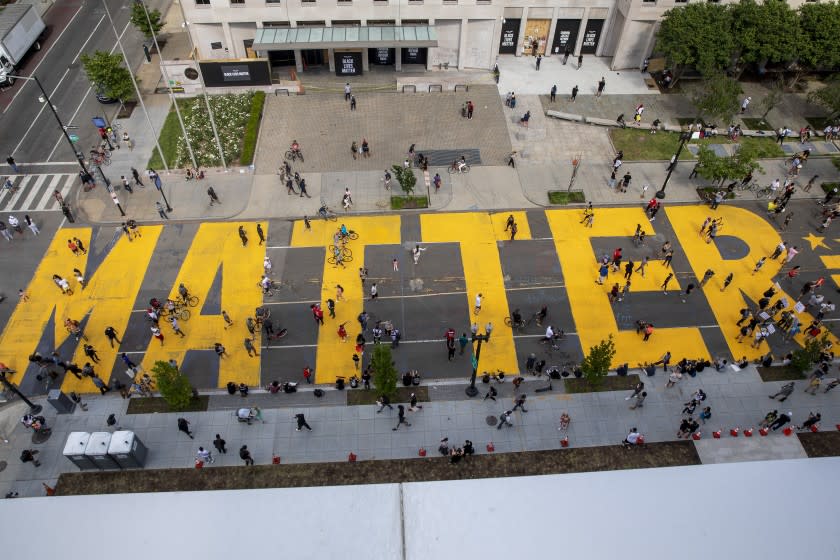Abcarian: Our year of living pandemically: The good, the bad and the light at the end of the tunnel

What an awful — and inspiring — year we have just had, so full of suffering and sadness, yet also with so much hope.
As we emerge from a nightmare that has claimed the lives of more than half a million Americans, we will never forget the sights of loved ones bidding goodbye through windows, corpses stacked in refrigerator trucks and the spike of fear accompanying a sore throat, headache or fever.
We’ll long remember the shock of empty grocery store shelves, of empty schoolyards and stadiums, shuttered restaurants and hair salons, and the desolation of roads whose rush-hour traffic normally bedevils us. And, much as we might like to, we won't forget President Trump standing behind his lectern, denigrating masks, championing discredited remedies and spewing false information with certainty about a virus scientists were still struggling to understand.
Who will ever forget the image of our nation’s foremost public health expert, Dr. Anthony Fauci, in full face palm, as Trump blathered about the “Deep State Department” in the White House press room? Or the look of sheer helplessness and resignation on the face of immunologist Dr. Deborah Birx when he suggested injecting COVID patients with disinfectant?
And then, amid all the horror of a raging pandemic swirling across the globe, cutting down everyone from strong adults in their prime to the vulnerable elderly in nursing homes, a different kind of galvanizing tragedy appeared on the horizon.
Two and a half months into our national lockdown, a Black man named George Floyd lost his life under the knee of a white police officer. Maybe it was impossible to mourn each victim of the pandemic, but we could all rise up in outrage against the crisis of systemic racial bias, police violence and the blatant disregard for the lives of Black Americans, many of whose first names we came to know: Breonna, Ahmaud, Tamir, Philando, Trayvon.
Protests, many of them spontaneous, swept the nation. Millions of people — mostly masked — gathered in a mass uprising against racism that historians have described as the largest such outpouring in American history. The vast majority of the gatherings — and by vast, I mean more than 93%, according to a nonprofit group that studies protests and political violence around the world — were peaceful.
The world shifted a bit on its axis; the unfinished work of the civil rights movement was laid bare. The rise in hate crimes against Asian Americans demonstrated — as if we needed proof — the ties that bind words to action; a president who constantly denigrates Chinese people, or Mexicans, will embolden racists.
I will always be awed by Washington, D.C., Mayor Muriel Bowser’s wonderful act of anti-racism. Last June, her Public Works Department painted “Black Lives Matter” in yellow block letters 35 feet tall on the street in the shadow of the White House, in a perfect retort to the dog whistles and outright racism of the man who lived there.
And in July, another memorable image emerged: In Portland, Ore., an unclothed woman who came to be known as Naked Athena, stepped into the street and struck ballet poses as she faced heavily armed federal agents whose presence had been opposed by state and city officials.
In the midst of the most severe public health crisis in a century, our sense of decency and righteousness was on full display.
As we would discover on Jan. 6, violent white supremacists suckered by Trump would try to have the last word.
We discovered our country is too good for them to prevail.
::
So, of all the things the pandemic has wrought, can we thank it for cutting short the tenure of the country’s worst president?
Maybe.
No one can say for sure that Trump’s mishandling of the outbreak was the single thing that brought him down, but the crashed economy combined with his lack of urgency or focus on another much-needed stimulus package, months of denial about the virus and his sheer unlikability surely contributed to Joe Biden’s decisive victory.
That was followed by the unexpected flipping of Georgia’s two U.S. Senate seats, an extraordinary feat for Democrats, which gave them a reed-thin majority (with Vice President Kamala Harris to cast tie-breaking votes), and in turn has led to the most progressive legislation to be passed by Congress since President Obama’s Affordable Care Act in 2010.
The American Rescue Plan will not just put money into the pockets of most Americans and extend unemployment benefits but will dramatically reduce the rate of child poverty and lift an estimated 16 million people out of poverty. It will give states money to administer COVID-19 vaccines and reopen schools.
Despite the fact that more than 75% of Americans support it, not one Republican in either the House or the Senate voted for it. No wonder Georgia went blue.
Our Year of Living Pandemically has taught us so much about ourselves.
We can honor the sacrifices inflicted on so many Americans by remembering that our job, and the government’s, is to lift those in need, to respect what science and experience have taught us, and to atone for the sins of our past.
Maybe I am naïve, but I believe most Americans would agree. After a really terrible year, the cold winter feels as if it's beginning to yield to a much warmer and sunnier spring.
@AbcarianLAT
This story originally appeared in Los Angeles Times.

